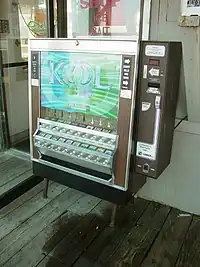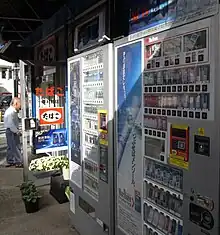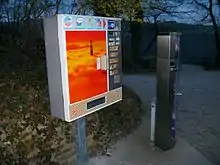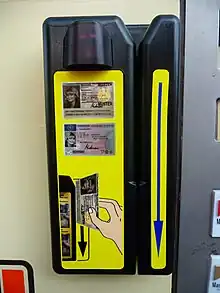

A cigarette machine is a vending machine that dispenses packs of cigarettes in exchange for payment. Many modern cigarette machines require customers to swipe an identification card to prevent persons under the legal smoking age from purchasing tobacco. Because of their potential for misuse by underage persons, many jurisdictions restrict where cigarette machines can be located or prohibit them altogether.
Bans and restrictions
In order to aid the restriction of sale of tobacco to minors, cigarette machines are regulated in many countries.

Japan
Since July 2008, companies may face prosecution if found selling tobacco to anyone under the legal age, 20 years old.[1] To avoid this, Japan has introduced a government registered electronic smart card, called Taspo, that allows the user to purchase from the machines.[2] To get a Taspo card, the purchaser must present their passport or ID to any government-authorized business offering the service.
As an automated way of determining age, the Fujitaka company is developing a technology that allows the vending machine to determine, using a digital camera and based on the facial wrinkles and sags of the potential buyer, whether the buyer is old enough to purchase cigarettes. The system compares facial characteristics including bone structure, sags, and crow's feet against a record of more than 100,000 people. However, if the user fails they can still use the machine with a Taspo card.[1]
Regulatory status by country


| Country/Territory | Situation regarding cigarette vending machines |
|---|---|
| Sales prohibited under 18. Can only be located in liquor licensed and gaming venues, must display health warnings and cannot contain images of product (only a description and price on a black and white label). | |
| Sales prohibited under 18. Machines must attempt to verify a customer's age by requiring the insertion of a debit card or mobile phone verification. | |
| Sales prohibited under 18. Machines need to be locked/unlocked by a responsible adult. | |
| Banned | |
| Regulations vary by province. Either banned outright or restricted to licensed facilities restricting admission to those above the age of majority. | |
| Banned | |
| Banned | |
| Sales prohibited under 18. Machines situated in bars and similar places only. | |
| Sales prohibited under 18. Machines generally situated in restaurants, bars and hotel lobbies. Age verification monitored by staff. | |
| Banned | |
| Banned | |
| Banned | |
| Banned | |
| Sales prohibited under 18. Machines must provide an age verification (usually: German identity card, European driving licence or Electronic cash-Card). Until 2007 the sale was prohibited to under 16. Since 31. December 2008 all public cigarette machines must have an age verification to prove that the buyer is 18 or over. | |
| Banned | |
| A ban was approved on 1 July 2010, following an amendment to the existing tobacco advertising law. A full ban never took effect, but a 2013 law prohibits vending machines for sale of tobacco products in public areas.[3] | |
| Banned | |
| Banned | |
| Sales prohibited under 18. Restricted to licensed premises only since 1 July 2009. Vending machines are operated by a token or card obtained from the bar once the age of the buyer has been identified. | |
| Banned | |
| Sales prohibited under 18. Machines must contain an electronic device to verify age of buyer. | |
| Banned | |
| Banned | |
| Sales prohibited under 18. Age has to be proven at the counter or bar before a token is issued so that the machine can be used. | |
| Sales prohibited under 18. | |
| Banned | |
| Sales prohibited under 18. Machines situated in bars and similar places only. From 10 December 2004, machines can only be operated by staff. | |
| Sales prohibited under 18. Machines are token operated. | |
| Banned | |
| Sales prohibited under 18. Machines must contain an electronic device to verify age of buyer. | |
| Banned | |
| Banned | |
| Banned | |
| Sales prohibited under 18. Must display health warnings and require the activation of the machine by the owner or by a special token (the machines can be found on restaurants, bars, gas stations, gaming venues or kiosks). It's strictly forbidden to advertise the sale of tobacco in the facade of any of those places except for specifically tobacco stores. | |
| Banned | |
| Sales prohibited under 18. | |
| Sales from machines are age restricted in 21 out of 26 cantons (12 cantons—under 16; nine cantons—under 18; five cantons—no age restriction (although most retailers won't sell to under 16.). | |
| Banned[4] | |
| Banned | |
| Banned in England since 1 October 2011, Wales since 1 February 2012, Northern Ireland since 1 March 2012, and Scotland since 29 April 2013 | |
| Only in facilities where people under 18 aren't allowed and will only be in traditional bars where people under 21 aren't allowed[5][6] |
See also
- Action on Smoking and Health
- Clark Whittington, creator of the Art-o-mat, a project to convert disused cigarette machines into art vending machines
- Distroboto, a Canadian project to convert disused cigarette machines into zine vending machines
- Taspo, a Japanese system for age verification at cigarette machines
References
- 1 2 "Japanese smokers to face age test". BBC News. 2008-12-06. Retrieved 2014-06-26.
- ↑ "Japan cigarette vending machines to require ID". Reuters. 2007-10-19. Retrieved 2023-09-19.
- ↑ https://www.gov.gg/CHttpHandler.ashx?id=81419&p=0
- ↑ "Thailand Details | Tobacco Control Laws". www.tobaccocontrollaws.org. Retrieved 2022-05-19.
- ↑ "Regulations Restricting the Sale and Distribution of Cigarettes and Smokeless Tobacco to Protect Children and Adolescents" (PDF). 19 March 2011. Retrieved 2014-06-26.
- ↑ Block, Dustin (June 29, 2010). "Cigarette vending machines are now illegal; Federal rule went int[o] effect June 22". Racine Post. Retrieved November 23, 2016.
